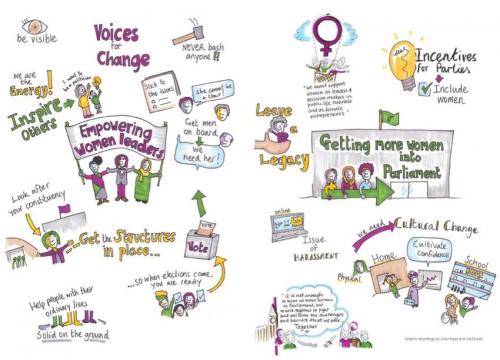
Global Coalition for Girls' Education.pdf (cam.ac.uk)
This article was published on the Faculty of Education News page on Tuesday 25 February 202, Cambridge University.
Full Report:26-EN-POLICY-NOTE-Political-leadership-LNGB-Feb-2020-DOUBLE-SPREADS.pdf (cam.ac.uk)
The study, written by academics in the Research for Equitable Access and Learning (REAL) Centre at the Faculty of Education, University of Cambridge, and commissioned by the Foreign and Commonwealth Office, urges politicians to collaborate ‘across geographical and political divides’, in a concerted drive to ensure that all girls gain access to education by an internationally-agreed target date of 2030. According to data gathered by UNESCO, an estimated 130 million girls are currently out of school. Over half of all school-age girls do not achieve a minimum standard in reading and mathematics, even if they do receive an education. The call for collective, inter-governmental approaches to address this is one of seven recommendations in the report, which together aim to provide a framework for ‘transformative political action’.
Among others, the authors also stress that marginalised girls will only be able to access education if governments adopt a ‘whole-system’ approach to the problem. That means addressing wider societal issues that currently limit women’s life chances beyond education – such as gender-based violence, discrimination, or social norms that force young girls into early marriage and childbearing. The full report, Transformative political leadership to promote 12 years of quality education for girls, is being published on 25 February, 2020, by the Platform for Girls’ Education. It is being launched in Geneva, as ministers convene for the 43rd session of the Human Rights Council. Co-author, Pauline Rose, Director of the University’s REAL Centre said: “Everyone – or almost everyone – agrees that improving girls’ access to quality education is important, but progress has been limited.
The report aims to provide a framework so that governments and those in power can turn goodwill into action.”“More than anything, we need to look beyond what individuals, or single Governments can do, because we will only address this challenge successfully through bipartisan coalitions and collective approaches.” The need to improve girls’ access to education is recognised in the UN’s Sustainable Development Goals, set in 2015. These include commitments to provide inclusive and quality education to all, and to achieving gender equality and the empowerment of all women and girls, by the year 2030. With the clock ticking on that deadline, initiatives such as the Platform for Girls’ Education have been launched to lobby for quality education for girls.
The Platform is part of the international ‘Leave No Girl Behind’ campaign, which calls for all girls to receive 12 years of quality education – an ambition restated by the present British Government in the December 2019 Queen’s speech. In a statement accompanying the report’s release, however, the UN Girls’ Education Initiative (UNGEI), which provided feedback on the study, observes that: “Political momentum is not being sufficiently translated into reforms that will put us on track to achieve our Global Goals by 2030. The world is failing to deliver on its promise of quality education, and girls remain the most marginalised.” Building on earlier studies, the new report identifies seven ways in which governments can take concrete, sustainable and effective action to resolve this. It was based on a global review of current efforts, with a focus on low and lower-middle income countries.
The researchers also carried out interviews with 11 current and former political leaders involved in championing girls’ education. Its seven main recommendations are:
1.Heads of government, ministers and MPs must use their platform to demonstrate commitment to the development of policies supporting the aim of 12 years of quality education for all girls. Senior civil servants should be equipped to ensure that this continues across election cycles.
2.Women leaders should be represented at every level of government to improve genderbalance in decision-making and to act as role models.
3.A global coalition of parliamentarians should be established to advocate for girls’ education, working across political divides.
4.Senior civil servants should invest in and use data on education that separates out information on gender and other sources of disadvantage, so that this evidence can inform policy-making.
5.Political leaders must collaborate with key stakeholders in gender equality and education issues – such as women’s and youth organisations, civil society organisations, and religious leaders.
6.Government ministers and civil servants should take whole-system approaches to embedding gender equality in national plans and policies, given the multiple barriers to girls’ education.
7.Governments should implement gender-responsive budgeting, that ensure sufficient domestic resources are applied to girls’ education. “Successful reform rarely depends on individuals acting alone,” the authors add. “It relies on alliances, collective action and advocacy. Networks and coalitions are vital to tackle issues that are beyond the capacity of individuals to resolve, as well as to provide a stronger, collective voice.
ABOUT REAL, CAMBRIDGE UNIVERSITY
REAL: Research for Equitable Access and Learning : Faculty of Education (cam.ac.uk)
Education is at the heart of social transformation. It is a fundamental human right and has the potential to reduce poverty, empower women, improve health and drive economic growth.
However, in some of the poorest parts of the world many children and young people are deprived of access to good quality education and denied the chance to learn and fulfill their potential.
The Research for Equitable Access and Learning (REAL) Centre pioneers research into overcoming barriers to education, such as poverty, gender, ethnicity, language and disability, and promotes education as an engine for inclusive growth and sustainable development.
Find out more about the REAL Centre and our key principles.









Add new comment